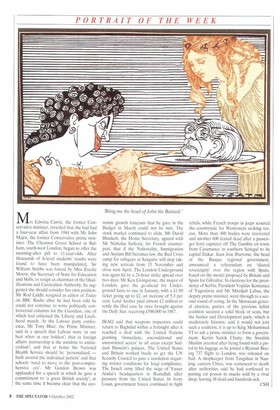M rs Edwina Currie. the former Conservative minister, revealed that she
had had a four-year affair from 1984 with Mr John Major. the former Conservative prime minister. The Chestnut Grove School in Halham, south-west London, began to offer the morning-after pill to 11-year-olds. After thousands of A-level students' results were found to have been manipulated, Sir William Stubbs was forced by Miss Estelle Morris, the Secretary of State for Education and Skills, to resign as chairman of the Qualifications and Curriculum Authority; he suggested she should consider her own position. Mr Rod Liddle resigned as editor of Today on BBC Radio after he had been told he could not continue to write politically controversial columns for the Guardian, one of which had criticised the Liberty and Livelihood march. At the Labour party conference, Mr Tony Blair, the Prime Minister, said in a speech that Labour were at our best when at our boldest'; that in foreign affairs 'partnership is the antidote to unilateralism'; and that at home the National Health Service should be 'personalised — built around the individual patient' and that schools 'need to move to the post-comprehensive era'. Mr Gordon Brown was applauded for a speech in which he gave a commitment to 'a great British society'; at the same time it became clear that the eco nomic growth forecasts that he gave in the Budget in March could not be met. The stock market continued to slide. Mr David Blunkett, the Home Secretary, agreed with Mr Nicholas Sarkozy, his French counterpart, that if the Nationality, Immigration and Asylum Bill becomes law, the Red Cross camp for refugees at Sangatte will stop taking new arrivals from 15 November and close next April. The London Underground was again hit by a 24-hour strike spread over two days; Mr Ken Livingstone, the mayor of London, gave the go-ahead for Underground fares to rise in January, with a £1.90 ticket going up to £2, an increase of 5.3 per cent. Lord Archer paid almost £2 million to settle the libel case he once brought against the Daily Star. receiving £500,000 in 1987.
IRAQ said that weapons inspectors could return to Baghdad within a fortnight after it reached a deal with the United Nations granting 'immediate, unconditional and unrestricted access' to all areas except Saddam Hussein's palaces. The United States and Britain worked busily to get the UN Security Council to pass a resolution requiring stricter conditions for Iraqi compliance. The Israeli army lifted the siege of Yasser Arafat's headquarters in Ramallah after pressure from the United States. In Ivory Coast, government forces continued to fight rebels, while French troops in jeeps scoured the countryside for Westerners seeking rescue. More than 400 bodies were recovered and another 600 feared dead after a passenger ferry capsized off The Gambia en route from Casamance in southern Senegal to its capital Dakar. Juan Jose Ibarretxe, the head of the Basque regional government, announced a referendum on 'shared sovereignty' over the region with Spain, based on the model proposed by Britain and Spain for Gibraltar. In elections for the presidency of Serbia, President Vojislav Kostunica of Yugoslavia and Mr Miroljub Labus, the deputy prime minister, went through to a second round of voting. In the Moroccan general election, parties of the previous leftist coalition secured a solid block of seats, but the Justice and Development party, which is moderately Islamist, said it would not join such a coalition; it is up to King Mohammed VI to ask a prime minister to form a government. Kerim Sadok Chatty, the Swedish Muslim arrested after being found with a pistol in his luggage as he joined a Ryanair Boeing 737 flight to London, was released on bail. A shopkeeper from Tangshan in Nanjing, eastern China, was sentenced to death after authorities said he had confessed to putting rat poison in snacks sold by a rival shop, leaving 38 dead and hundreds sick.
CSH




































































 Previous page
Previous page